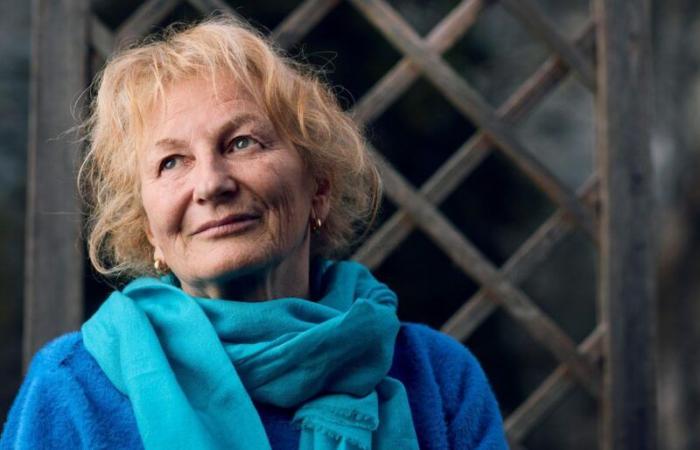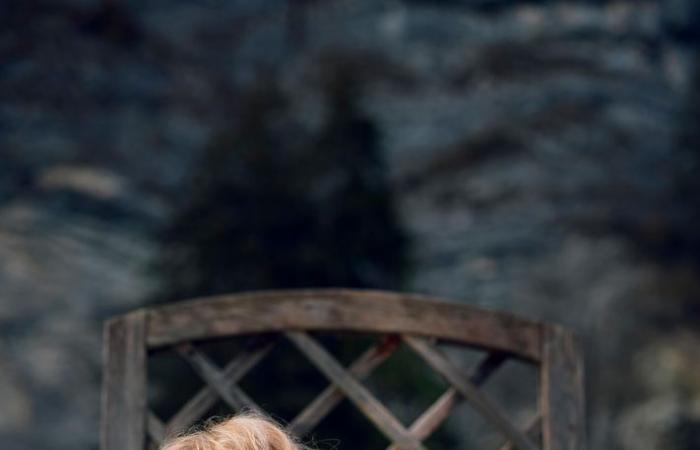Nicole Niquille, the pioneer –
The incredible life of the first Swiss mountain guide
The 68-year-old from Friborg dedicated her daily life to summits until this accident which deprived her of the use of her legs, but not of moving forward.
Published today at 10:59 a.m.
Nicole Niquille has not yet watched “Kaizen”, the Inoxtag documentary. But she talked about it with her nieces.
Yvain Genevay/Tamedia
Subscribe now and enjoy the audio playback feature.
BotTalk
- In 1986, Nicole Niquille was the first woman to obtain a mountain guide certificate in Switzerland.
- An accident left her paraplegic, but she remains positive and active.
- She helped build a hospital in Nepal to support women and children.
- At 68, she continues to dream and explore the mountains differently.
Anyone looking to calm down would benefit from a discussion with Nicole Niquille. An infectious good mood, a smile that fades only to evoke the many tragedies experienced throughout her rich 68 years spent on earth, and an ability to move forward again and again: the Fribourgeoise was the first Swiss mountain guide . She made the Alps her playground. She also carried out expeditions, including one to Nepal to climb the dangerous K2 in the 1980s. Without oxygen, but with the soul of a mountaineer.
At this point you will find additional external content. If you accept that cookies are placed by external providers and that personal data is thus transmitted to them, you must allow all cookies and display external content directly.
Allow cookiesMore info
Pure and hard mountaineering, far removed from the projects of Inoxtag or other YouTubers. “The new mountaineering is extremely restricted. It’s Everest, it’s Mont Blanc, it’s Ama Dablam because it’s beautiful. There are still adventure areas, but Everest must be excluded.”
She was able to practice for almost eight years before an accident left her paraplegic. “The past is the past. It must serve as an experience for me. The present lives up to its name. It’s a gift, because I’m here today, I woke up this morning. And the future is for dreaming,” she philosophizes, serving us a glass of water.
We will quickly understand that she is not the type to mope about her fate. On the other hand, she doesn’t mind talking about her years of mountaineering at all – “I can talk about it without it making me cry.” And particularly from the beginning, with this motorcycle accident which almost tore off his left leg at the age of 18. The doctor advises him to practice a gentle sport. Nicole Niquille agreed to go to the mountains with her twin sister, before falling in love with a mountain man. “That was the trigger,” she laughs.
Pioneer in spite of herself
The couple then spent all their free time at altitude, but the teacher wanted more. His long vacations were not enough to satisfy his thirst for freedom in the mountains. She therefore decided to take the guide’s certificate, without knowing that no woman had done it before. His left leg, free of a muscle, didn’t bother him too much. “In mountain shoes, the foot remained square. I didn’t have cramps unlike the others,” she smiles.
The doctors consulted did not want to sign his medical certificate, which is essential for guide training. Nicole Niquille insisted to a doctor friend, who gave in. “If I am not able to pass the course, I will not take it. That’s all.”
At this point you will find additional external content. If you accept that cookies are placed by external providers and that personal data is thus transmitted to them, you must allow all cookies and display external content directly.
Allow cookiesMore info
This is how, in 1986, Swiss mountain guides counted the first woman in their ranks. She passed the exam without special treatment.
“There was a candidate from Zermatt who weighed 106 kilos. We were put into pairs to examine the teams of two. One plays the role of guide, the other of the client. And at some point, the customer has to jump or slide into a crevasse. That was Paul’s role. Him, he was green, laughs the mountaineer, who wasn’t leading either. I was red. Because even though I knew he was going to fall, I had my nose to the ground.”
The relationship with death
Once his paper in his pocket, the mountaineer continued his route. Pakistan, Nepal. There was this attempt to climb K2 (8611 meters), stopped by a venous thrombosis in the leg. “I knew it was ridiculous to continue. Maybe I could have made it to the top, but I wouldn’t have come down.”
She knows enough mountain enthusiasts who have lost their lives there. “It’s not a life without scratches,” she slips, thinking of her missing friends. Death is never too far away in this environment. Before her K2 expedition, Nicole Niquille sought approval from her mother and twin sister. “She had just lost her husband in the mountains in an avalanche.” However, both said yes. Nicole could leave with a light mind.
“The anxiety comes from what we don’t know,” she adds. And so, we must deal with known dangers, such as rockfalls and avalanches, and limit the unknowns. The mountain must be tamed, understood, studied. “There are really a lot of people who died trying to make firsts,” she continues. I think that pride is a feeling to abandon when you want to be in the mountains for a long time, or at least be an old guide.”
All the caution in the world would not have prevented the accident. A stone fell from this cliff that Nicole Niquille admires every day from the large windows of her renovated – and adapted – farm. That day, she was picking mushrooms, and the stone hit her on the head.
The new reason for being
The accident leaves her paraplegic. He forces her to use a wheelchair. It prevents her from doing this job that she loved so much. She separated from her husband at the time. “He was my nurse, my driver, my cook… the relationship was no longer the same. It was me who wanted us to separate,” she explains. She then bought the Lake Tanay inn. There she met her husband, Marco, who had been commissioned to rewire the inn during the takeover. After seven years, a new adventure was born in Lukla, Nepal.
The local population neededa hospital. A construction financed and technically supported by the Nicole Niquille Foundation. The goal: to help the local population, especially women and children, to honor the wish of the late Pasang Lhamu Sherpa, the first Nepalese woman to climb Everest. The Fribourgeoise is delighted to have found a useful activity. She confides frankly that she would also have liked to find a lucrative activity. The wheelchair makes job searching difficult. “I like counting pennies. I miss counting what’s in the purse in the evening when the bistro closes.”
Her voice betrays a disappointment that she quickly sweeps away with her contagious optimism. It is quite good, in its valley deprived of sun two months a year.
At this point you will find additional external content. If you accept that cookies are placed by external providers and that personal data is thus transmitted to them, you must allow all cookies and display external content directly.
Allow cookiesMore info
Because she knows that the sun is never really far away, and she appreciates its return all the more. Also because she always manages to return to the mountains, by sled or by joëlette with guide friends or her nieces. “They are as crazy as me,” laughs the intrepid pioneer, who took part in the Bénichon de Charmey, a cart race, just three weeks ago.
Why deprive yourself of it, after all? “Among people my age, it seems that there is no more room for projects, for dreams, or for deviating from the norms.” At 68 years old, Nicole Niquille still aspires to rise. No longer through the summits, but through everything that life can offer him. And everything she can give to others.
Rebecca Garcia is a journalist in the sports section. Holder of a master’s degree in journalism from the University of Neuchâtel, she is particularly interested in alpine skiing and the economics of sport.More info
Did you find an error? Please report it to us.
0 comments







